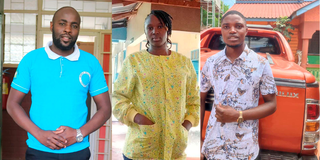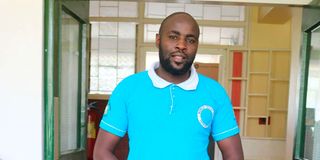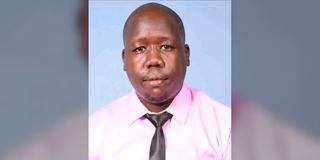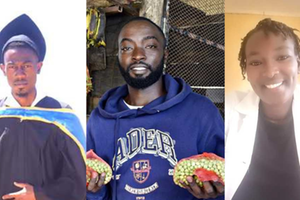The forgotten frontliners: UHC workers speak out

Medics (from left) Shaban Onyango, Margarete Wanjiru and Henry Adeka.
Shaban Onyango (33), Community Health Officer, Kakamega County
I broke my backbone while on a government motorbike tracing suspected Covid-19 cases in Kakamega.
My name is Shaban Onyango Osero (33). I work as a UHC staff employee hired by the national government and posted to Kakamega County in June 2020 during the coronavirus pandemic.
That year, I was involved in a road accident while riding a government motorbike issued for tracing suspected Covid-19 cases reported by citizens.

Shaban Onyango (33), a Community Health Officer from Kakamega County.
I sustained a dislocated shoulder, a broken lower limb and persistent, excruciating back pain that would later change my life.
Initially, I received treatment for my leg wounds and twisted shoulder.
The back pain subsided and I ignored it until 2023, when it returned. A visit to a health facility resulted in painkillers and gel, which worked temporarily.
By March this year, the pain became unbearable and I sought further medical attention and was advised to undergo a CT scan.
The results revealed lumbar spondylosis, which the doctor attributed to trauma from the accident. Lumbar spondylosis is the degeneration of the spine, commonly due to aging but in my case, the injury accelerated it. It causes pain, stiffness and muscle spasms.
My condition has made daily duties difficult. I earn a monthly stipend of Sh33,000 without medical benefits and supporting my family has become a nightmare. I can no longer perform the tasks I used to, and the burden is overwhelming.
I hope the National Assembly remembers our sacrifices and urgently allocates the Sh8.8 billion needed to resolve our pending issues.
Margarete Wanjiru (30), UHC frontline nurse, Murang'a County
Working as a Covid-19 frontliner cost me a lung and left me battling depression.
For the past five years, I’ve depended on one lung to breathe. Inhaling and exhaling has become an agonising task.
I contracted Covid-19 four times and suffered from pneumonia and tuberculosis (TB), leading to pleural effusion, an abnormal fluid build-up in the lungs.

Margarete Wanjiru (30), a UHC Nurse from Murang’a County who says working on the Covid-19 frontlines destroyed one of her lungs after she contracted TB, Pneumonia and coronavirus four times, almost losing her life.
As a result, I now suffer from anxiety and depression requiring constant unaffordable medication.
I was hired in 2020 by the Ministry of Health under the Universal Health Coverage (UHC) programme as a Covid-19 frontline nurse in Murang’a County. At the time, movement was restricted and the government called on 8,571 medics across 17 cadres to serve the nation.
We were promised in writing that our contracts would eventually lead to permanent and pensionable (PnP) terms and gratuity after three years. I was 25, full of dreams, and eager to serve my country.
At Tambach Sub-County Hospital, we cared for critically ill patients with minimal resources—few PPEs, gloves, or masks. I contracted Covid-19 repeatedly and later TB and pneumonia due to overexposure.
Today, I earn a Sh50,000 stipend, heavily taxed and with no health insurance. My family has borne the cost of my treatment. We have no allowances, academic leave or benefits. While others on permanent terms earned more and avoided high-risk wards, we bore the brunt.
It’s time for Kenya to remember the soldiers who stepped up when the country needed them most.
Henry Adeka (31), Laboratory Officer, Taita Taveta County
Attending to a co-infected patient who had defaulted on treatment infected me with chronic TB.
In 2020, I joined the Ministry of Health’s Covid-19 response team and was deployed to Mwambirwa Health Center, a remote facility in Taita Taveta County.

Henry Adeka (31), a Laboratory Officer from Taita Taveta County.
Despite the hardship, I carried out lab tests and counselling. One day, I tested a patient co-infected with HIV and TB, who had defaulted on treatment. They had not disclosed their condition initially. By the time I saw their TB treatment card untouched for weeks, I realised I’d been exposed.
Two weeks later, I tested positive for TB.
Mwambirwa is nestled in the forested Taita Hills, five kilometres from the nearest home. I walked 14km daily to and from work. Sometimes, I’d get soaked in rain. Despite the risk, I had no risk allowance, commuter allowance or housing allowance.
My contract, unlike others on permanent terms, did not include these benefits. I worked under harsh conditions, but with no savings or emergency support. With constant contract renewals and no gratuity or job security, my dreams now feel like a mirage.
Ronald Maiyo (32), UHC Nurse, Elgeyo Marakwet County
I saw so many dead bodies during Covid-19 that the ghosts still haunt me.
I am Ronald Maiyo, a UHC nurse based in Elgeyo Marakwet. The year 2020 left a permanent scar on my life.
I cared for patients at Tambach Sub-County Hospital and witnessed countless deaths. Today, I live with PTSD. I can’t sleep without reliving the trauma, and I’m on medication I can barely afford.

Ronald Maiyo Nurse from Elgeyo Marakwet, who got Covid while treating patients as a frontliner.
At the height of the pandemic, I worked with little to no PPE, enduring long hours and emotional exhaustion. Despite this, I received no salary or allowance, not even the Covid-19 allowances distributed to permanent staff.
Then I caught the virus.
What followed was a psychological collapse. I was isolated both physically and emotionally. Friends and neighbors avoided me. I couldn’t shop or visit my family. I felt like a ghost in my own home.
The experience left me traumatised. Sleepless nights, recurring memories of death, and a profound sense of neglect engulfed me. What haunts me most is not the illness—but the silence of a system I gave everything to.
Today, I speak for myself and thousands of medics who were left behind. Our sacrifices should never be forgotten.


